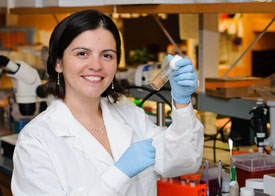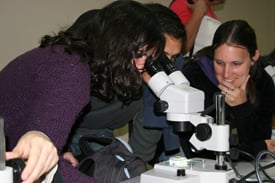
With support from UMMS, Yuly Fuentes, PhD, and colleagues have teamed up with pioneering Latin American scientists to spread the word about invertebrate model systems to young scientists in Latin America.
When recent Graduate School of Biomedical Sciences graduate Yuly Fuentes, PhD, was growing up in Chile, she had no idea that huge scientific discoveries could be made studying extremely small organisms. Now that she’s completed her PhD in neurobiology, she wants to spread the word and create opportunities for budding scientists in her native Chile and other Latin American countries where science struggles because of funding.
According to Dr. Fuentes, invertebrate model systems are the source of many discoveries in neurobiology research and many other areas of scientific inquiry and are well suited for use in parts of the world where funding for science is very limited, because their use and maintenance is relatively inexpensive and they are amenable to genetic manipulation that can yield tremendous results.
Supported by the UMMS Department of Neurobiology, Fuentes has teamed up with pioneering Latin American scientists Jimena Sierralta, PhD, of the University of Chile, and John Ewer, PhD, of the University of Valparaiso (since 2010), to introduce young Latin American scientists, including graduate and undergraduate students and junior faculty, to this rich scientific resource and at the same time help foster a global community of invertebrate researchers similar to the community at UMass Medical School.
The 2012 Small Brains, Big Ideas workshop, which takes place in Chile from Oct. 29 through Nov. 7, is presented in two sessions: the first comprises lectures by prominent invertebrate researchers, followed by hands-on lab time for the students and is being held in Santiago; the second half is a scientific symposium where students can present their work and hear the senior scientists present their research and is taking place in Valparaiso. The venues were chosen for their central location in Latin America, making participation for individuals outside of Chile more feasible.
Through this project, GSBS students and faculty have become engaged to help spread the word about invertebrate research. In the first Small Brains, Big Ideas workshop held in 2010, faculty members who use the invertebrate model system in their research participated in the workshop as lecturers and mentors. Many will return this year, including Mark Alkema, PhD, assistant professor of neurobiology; Claire Benard, PhD, assistant professor of neurobiology; Vivian Budnik, PhD, professor of neurobiology; Marc Freeman, PhD, associate professor of neurobiology; Steven Reppert, MD, chair and professor of neurobiology; and Scott Waddell, PhD, formerly associate professor of neurobiology, now at Oxford University. Michael Francis, PhD, assistant professor of neurobiology, will also be joining the group this year. UMMS graduate students serving as teaching assistants in 2012 include PhD candidates Allie Muthukumar and Jennifer Pirri and MD/PhD student Timothy Rooney.

Twenty-eight students attended the 2010 workshops, coming from Argentina, Brazil, Chile, Colombia, Peru and Uruguay. Here, they participate in hands-on research.
Twenty-eight students attended the 2010 workshops, coming from Argentina, Brazil, Chile, Colombia, Peru and Uruguay. Fuentes and her colleagues have received more 2012 applications for participation than they can accommodate and are in the process of narrowing down the list of candidates who will be invited to attend. All students will be offered scholarships provided by some of the sponsors, which include the Biomedical Neuroscience Institute, University of Chile; Biomedical Institute and Interdisciplinary Center of Neuroscience of Valparaiso, Chile; Oxford University; Wellcome Trust Foundation; Programa AMSUD Pasteur; The Company of Biologists; the UMMS Department of Neurobiology; and the GSBS.
The current team is hoping that Small Brains, Big Ideas will become a sustainable endeavor, with the current UMMS students enlisting newer GSBS students to become involved by sharing their enthusiasm for the mission of the project and the chance to become part of an international community. The students currently involved are instrumental to the workshop’s success: Muthukumar, Pirri and Rooney are assisting with all of the wet lab work and organizing all of the course work. “The workshop would not be possible without the involvement of the graduate students,” said Fuentes.
If you are interested in learning more about Small Brains, Big Ideas, or would like to become involved, send an email to sbbiplus@gmail.com. To see video highlights from the 2010 workshop, visit http://video214.com/play/Xy9aoVF4RZ0JTroQ5EX78A/s/dark.